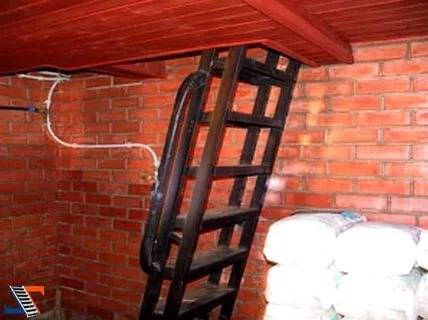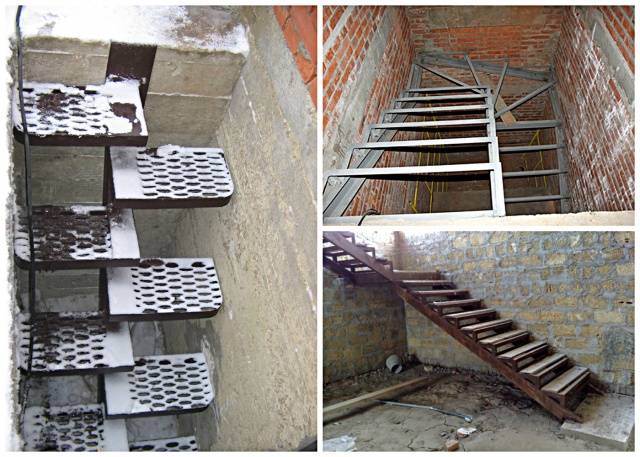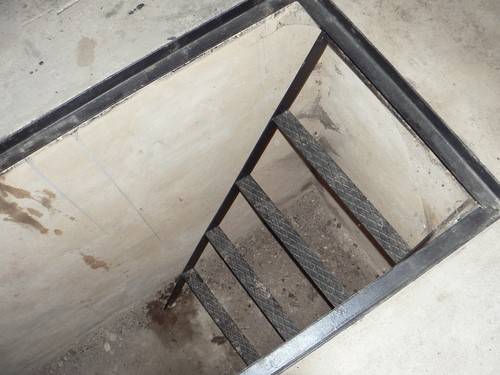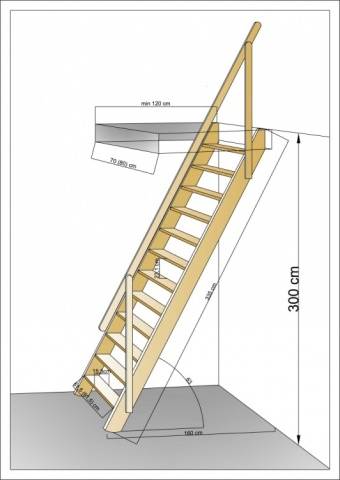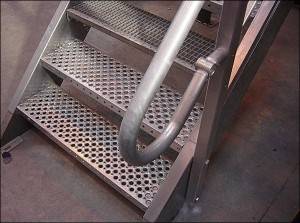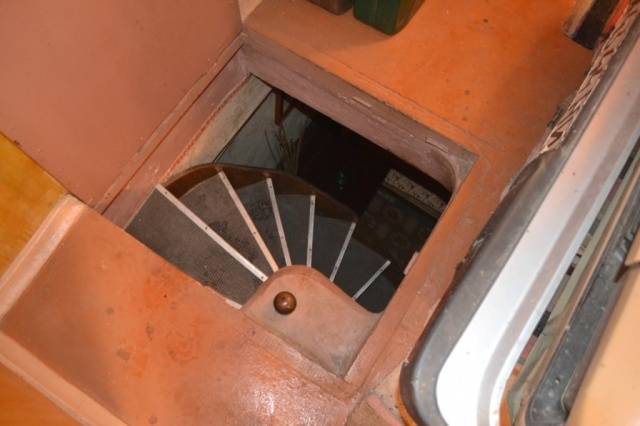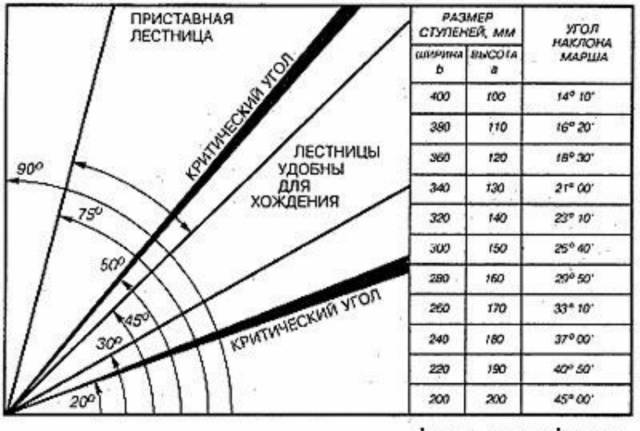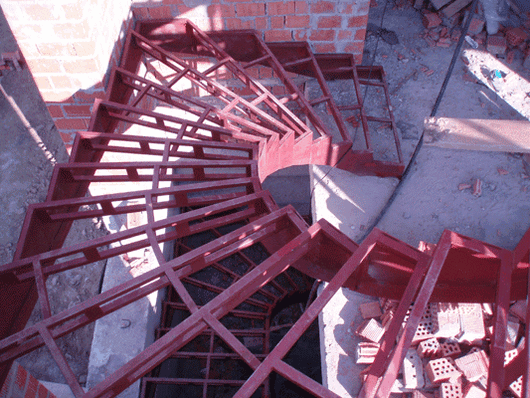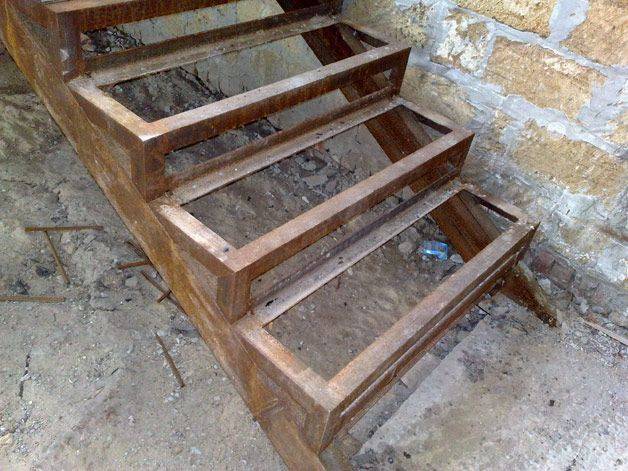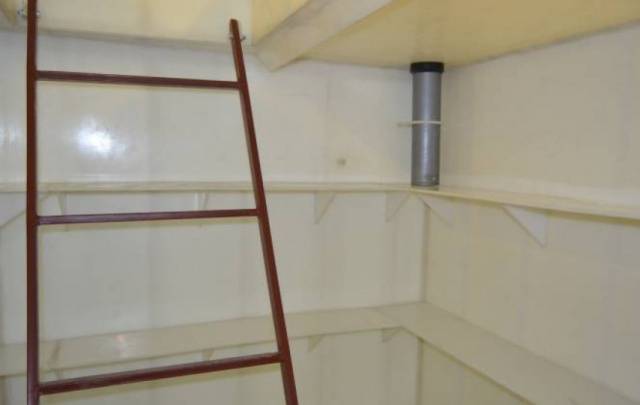Content
- 1 Variants of stairs for the cellar, and what to consider when choosing their design
- 2 Choosing the type of stairs to descend into the cellar
- 3 What do you need to know when calculating a basement staircase?
- 4 What is needed to make a metal ladder
- 5 The procedure for making a staircase using a corner and a channel
- 6 Ladder made of pipes
A cellar in a private courtyard is located under one of the buildings or installed on the site as a free-standing structure. For descent inside the premises, a staircase or steps are equipped. Most often they are made from wood due to the availability of the material, and the ease of its processing. But even if the cellar is in the basement of the house, dampness is constantly present inside, mercilessly destroying the wooden structures. Under these conditions, a metal staircase to the cellar is more reliable, which, although prone to corrosion, will last much longer than a wooden counterpart.
Variants of stairs for the cellar, and what to consider when choosing their design
In general, for a cellar or basement, there are three types of stairs, differing in the material of manufacture:
- Wooden structure very convenient in terms of manufacturing. However, this natural material is afraid of dampness. You can slightly extend the life of the wood if you take oak or other hard woods for making the descent. Additionally, the workpieces are impregnated with an antiseptic solution, after which they are painted. All of these measures are fine, but only for a short time.
- Concrete descent with steps is an ideal structure for a cellar, but rarely used in the private sector. If the cellar is located under the house, then it is advisable to erect such a descent during the construction of the building itself. A concrete staircase requires a lot of labor and precise design.
- The golden mean between these two constructions is metal staircase, which, if you have a welding machine, is easy to make yourself. Steel is less susceptible to moisture than wood. A metal staircase only needs to be tinted periodically, but even without this it will serve the owner for many years. Only without staining the metal will be covered with rust.
It is still necessary to choose the material for the manufacture of the stairs, taking into account the location of the manhole in the cellar. In a free-standing basement, of course, the entrance will be located from the street. In spring and autumn, wet mud will stretch behind the soles of your shoes, and in winter - snow. This means that for a street cellar you only need a staircase made of durable material, such as metal.
When making a descent into the cellar with your own hands, it is necessary to take into account several important nuances:
- The shape and dimensions of the structure depend on the area of the basement. For example, for a small cellar under the garage, the only way out of the situation is a small ladder.
- The more often the basement is used, the more comfortable the stairs should be. If the dimensions of the room allow, then it is advisable to organize the descent more gently and with handrails.
- A person will lower the conservation, the harvested crop from the garden, etc. into the cellar. And this is an additional load on the stairs. Metal is a strong material, but if you take thin-section workpieces, the structure will bend under load.
- In addition to the strength of the stairs, you must take into account its width and slope. The crops harvested from the garden are taken to the cellar with buckets, and even boxes. The descent should be convenient for a walking person with an oversized load.
If the basement is located under the house, then the entrance to it will be from the premises.For aesthetics, you can try to make a neater staircase that does not spoil the entire interior. Even at the design stage, they think over the configuration, dimensions and method of fastening the structure for the descent.
Choosing the type of stairs to descend into the cellar
To descend into the cellar or basement use side and marching stairs. The choice of a suitable design depends on several factors:
- the dimensions of the basement, and for what purposes it will be used;
- how much money are you willing to spend on making the trigger;
- frequency of use.
Let's take a look at a simple example. Let's say you will use the cellar often, but there is no money and time to make a flight staircase. And the room is so small that there is nowhere to place the structure. In this case, preference should be given to an attached metal ladder. If you have the means, time and desire, there is enough space, and you will use the cellar often, then here you can already stop at the marching structure.
When choosing marching structures for construction, one must take into account the complexity of their manufacture. It will require the development of accurate drawings and the correct selection of material. After all, incorrectly selected thin blanks will bend over time under the influence of gravity, and the staircase will acquire an ugly shape.
Attachable type of stairs
Conventional ladders are most often used in summer cottages. With the help of this simple structure, they organize a descent into the cellar located under the building. These basements are often accessed through a small hatch on the floor. You can go down here only by the attached stairs at a steep angle. The inconvenience of the design is still a narrow step, on which you will not stand for a long time.
However, even such a primitive descent can be designed according to different principles. If the basement allows you to make a greater slope of the ladder, and the hatch is not so small, the structure is installed permanently. For comfort and reliability, railings are welded from the pipe. And the steps themselves can be expanded. For a very small cellar, a removable ladder is welded. Usually this design is narrow and made of a thin profile. It is irrational to use thick metal for a removable ladder, as you often have to carry it on yourself.
The bottom of the structure is equipped with rubber heels or steel pins to prevent slipping on the floor. On top of the ladder, two hooks are welded for fastening, so that during the movement of a person, the structure does not tip over backwards.
The steps in the ladder are welded with a pitch of 34 cm, but no more. Over a long span, it is bad to rearrange the legs, especially if a person walks with a load. On shallow spans, the step becomes more frequent, as a result of which fatigue increases. It is good if the steps are made of corrugated metal that does not allow the foot to slide. You can even bolt on the rubber pads.
For a stationary ladder, the metal can be taken thicker. A channel and a corner are usually used. The handrails are welded from a pipe with a diameter of 25 mm. The bottom of the descent can be concreted into the floor. In another case, the heels made of sheet steel are welded to the channel, and then fixed with anchor bolts to the concrete floor of the cellar. The top of the attached stationary ladder is screwed with anchors to the frame of the hatch or the top of the basement wall.
Marching type of stairs
If the construction of the cellar is still at the stage of project development, then just this time should be used for calculating the marching staircase. There are many design options, and the entrance to the basement will be simultaneously developed for a specific model.
Marching slopes are more difficult to manufacture, but they have an undeniable advantage over attached structures:
- a gentle slope provides a comfortable movement of a person, even with a load;
- the design allows you to make an increased step width, very comfortable for the foot;
- a small step determines the ease of walking.
On the marching descent, handrails are made. Sometimes they are installed on both sides of the stairs. Then they still play the role of a fence that does not allow an elderly person or children to fall.
When designing a staircase from metal to the cellar, you can take care of its beauty. Beautiful and safe steps are made of perforated stainless steel. The end of the handrails can be rounded so that they do not stick out with a piece of cut pipe.
If the entrance hatch of the cellar is narrow, and you don't want to make a ladder, then you can weld a screw model from metal. The only drawback of the design is the inconvenient movement along the steps with a load. Spiral staircases are difficult to manufacture, so they are rarely used for cellars.
What do you need to know when calculating a basement staircase?
To make it convenient to walk up the stairs, it must be properly designed. Let's take a look at a few nuances worth paying attention to:
- The ladder is placed at a steep angle from 22 to 45about... Marching slopes are gentle with a slope of less than 45about... The width of the steps is selected according to the size of the free space in the cellar. Although the standard is considered to be steps with a width of 700-900 mm. The distance from the steps to the ceiling should be at least 2 m. Then, when walking, a person does not have to bend down.
- The number of steps is calculated along the length of the ladder. To do this, its length is divided by the height of the step, which is in the range of 150-180 mm. One flight must contain a maximum of 18 steps. Otherwise, it makes sense to build a structure of several marches. The step is made about 300 mm wide.
- For deep cellars, structures are made of two or three flights with a turn of 90 or 180about.
- The railing is placed at a height of 800–900 mm from each step. For their fastening, vertical posts are installed with a pitch of 150 mm.
The metal descent is placed on a monolithic concrete floor or reinforced concrete slab. A heavy structure must not be resting on a soft base. Otherwise, it will simply submerge.
What is needed to make a metal ladder
It should be noted right away that for the manufacture of a metal ladder you will need a welding machine and a grinder. You can't do without these tools. A channel is best suited for the base, but a profile pipe can be used. It is more convenient to cook the frame of the steps of the marching structure from a metal corner. A smaller profiled pipe is also suitable. The steps themselves are sheathed with sheet metal with a thickness of 1 mm. If desired, steps made of oak boards can be fixed to the frame from the corner.
Handrails and racks for them are made of a round tube with a diameter of 25 mm. Although on the racks, you can use workpieces thinner, for example, 20 mm. To make rounding at the ends of the handrails, the pipe will have to be bent in production. If this is not possible, then the rounding can be welded from shop elbows of the same diameter. Only then should the welding joints be carefully ground to avoid injury to the hand.
The procedure for making a staircase using a corner and a channel
So, for the base of the marching structure, two channels are prepared. Their estimated length should be sufficient from the cellar floor, taking into account the concreting of the lower end to the edge of the entrance hatch. The frame of the steps is welded from a corner with a section of 50 mm. For cladding, sheet metal with a thickness of 1 mm was taken.
Before you start cutting the workpieces, you need to carefully review the drawings again. Short elements can be boiled in pieces, but the overall appearance of the structure will be spoiled. In the case of channels, the pieces must not be cooked up.A bad weld seam under load can crack, so only a one-piece channel should be taken for the base.
The next step is markup. The channel and the corner are marked according to the dimensions in the diagram. The workpieces are cut with a grinder. In this case, all cut points must be sanded with a deburring grinding wheel.
When all the elements are ready, two channels are laid parallel to each other, after which a markup is applied under each step. If the dimensions of the cellar allow you to weld the steps on the ground, then the finished metal structure will only have to be installed in its place. But most often the size of the cellar is limited, and even two people cannot lift such a weight.
The easiest way is to immediately install the base from the channels in its place. Then it will only remain on the frame in turn to weld each step. In this situation, each person is looking for an easy way to solve the problem.
The finished metal structure in the cellar must be concreted. Here, a pit with a depth of about 200 mm should already be prepared in advance. It's good if you put a piece of reinforced concrete slab on its bottom to securely support the stairs. Now it remains to fill the lower part of the structure with concrete with rubble in this pit. The upper part of the ladder is fixed with anchors to the wall. The structure will turn out to be heavy, therefore, it is better to install two supports from a pipe or channel, supporting the upper part of the stairs, near the same wall. In the end, the steps are sheathed with sheet steel, the welding seams are cleaned with a grinder and the metal structures are painted.
Ladder made of pipes
A ladder made of pipes is usually made 2.2 m long and 70 cm wide. For racks, two pipes with a diameter of 50 mm are taken. The crossbeams will be located in 25 cm increments. Blanks for them 70 cm long are cut from a pipe with a diameter of 25 mm. The first crossbar is welded, stepping back from the top of the struts 25 cm. Further, the set step is observed.
The lower part of the racks is cut obliquely with a grinder. The resulting sharpening will prevent the ladder from sliding across the floor. From above, two hooks are welded to the posts for fastening, but you can do without them.
The video shows a homemade ladder:
When making stairs to the cellar, you need to think about your safety. This means that you should not save on materials and neglect the correct calculations.
